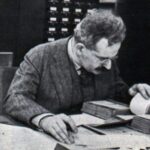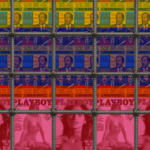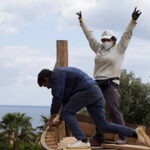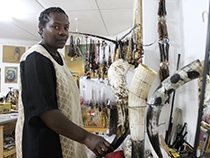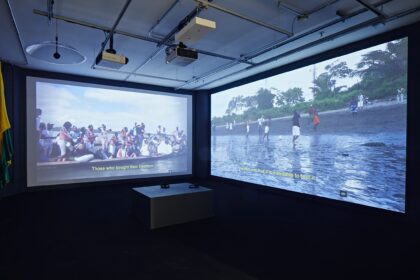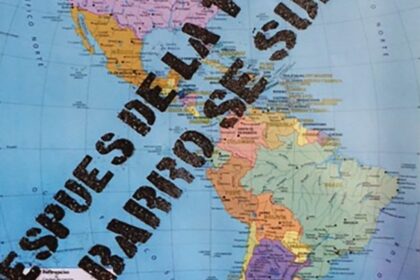Correspondence on the German Student Movement
Theodor Adorno and Herbert Marcuse
![[Image 1. Anti war protests at the University of California, San Diego, 1970. Credits: Fred Lonidier]](http://field-journal.com/stagejanV2/wp-content/uploads/2016/10/0605-35.jpg)
San Diego, November 2016.
* * *
Reading Between the Lines
Esther Leslie
On 31 July, Marcuse responded to the telegram and another letter from Adorno. The letter was unreadable, the script too small. Marcuse implored Adorno to have it typed up, for his words were so important to him. He also drew Adorno’s attention to the fact that in an interview, printed in Spiegel on 28 July, he had indeed avoided all reference to Horkheimer’s remark. But he closed the short note with a question: ‘If the Spiegel quote was so wrong—why did Max not correct it?’. [1] On the same day, Marcuse wrote to Rudi Dutschke thanking him for the open letter in his support sent to Spiegel and signed by a number of new left activists. It condemned the witch-hunt against Marcuse and the ‘Stalinist’ smear tactics peddled by reactionaries of all shades. [2]
Within a few days, Adorno replied to Marcuse and passed the letter to his secretary. As she typed it up on 6 August, Adorno lay dying. Despite warnings from his doctor, he had travelled by cable car up a 3000 metre Swiss mountain peak. His heart was aching. He came back down the mountain, went into a shoe shop to make a purchase and, while there, suffered a fatal heart attack at the age of sixty-five.
Six months later, on the night of 14 February 1970, Hans-Jürgen Krahl, aged twenty-seven, was a passenger in car heading for Frankfurt [Krahl was a student of Adorno who had contributed to New Left Review]. The car skidded on ice and smashed into a lorry travelling in the opposite direction. Krahl died at the crash scene. [3]
![[Image 2. Anti war poster at the University of California, San Diego, 1970. Credits: Fred Lonidier]](http://field-journal.com/stagejanV2/wp-content/uploads/2016/10/0642-23.jpg)
Prof. Dr. Theodor W. Adorno
6 Frankfurt am Main
Kettenhofweg 123
14 February 1969
Dear Herbert,
I wrote to you on 24 January and enclosed for the dean of your faculty an official English invitation from the Institute. Since I have still not received a response, I am rather afraid that, due to some sort of catastrophe—be it natural or social—the letter has gone astray. I am requesting a rapid response, in case I need to send you carbon copies.
By the way, I committed an error of form: an invitation from the Institute can de jure only originate from Friedeburg, Gunzert or me, but not Habermas. Though he is the co-director of the sociology department, he is not formally part of the Institute; and the two things must be kept separate from each other in organizational terms. I need not say that the invitation met with Jürgen’s full approval.
Things have been terrible again here. A SDS group led by Krahl occupied a room in the Institute and refused to leave, despite three requests. We had to call the police, who then arrested all those who they found in the room; the situation is dreadful in itself, but Friedeburg, Habermas and I were there, as it happened, and were able to guard against the use of physical force. Now there is a whole lot of lamentation, even though Krahl only organized the whole stunt in order to get taken into custody, and thereby hold together the disintegrating Frankfurt SDS group—which he has indeed achieved in the meantime. The propaganda is presenting things entirely back to front, as if it were we who grasped at repressive measures, and not the students who yelled at us that we should shut our traps and say nothing about what happened. This is just to put you in the picture, in case rumours and rather colourful accounts should filter through to you.
In spite of everything, my book is progressing quite well; I almost feel like saying unfortunately, because the events leave me quite unmoved in a way that I can hardly explain to myself. I do not even feel the fear to which I am entitled. On the other hand, the intensity with which I am throwing myself into my work may be steeling me a little bit. I hope to get far enough in the rest of the so-called vacation weeks that whatever remains to be done is of a more or less technical nature.
I also want to let you know that Max has every intention of being here too on the same days as you.
I am in quite good health, apart from a chronic lack of proper rest. And we survived the winter—which has taken on such a frightful form again in the last few days—without catching Hong Kong flu.
Much love to you both—from Gretel too.
Your old friend Theodor

Herbert Marcuse
Dept. of Philosophy
University of California at San Diego
5 April 1969
Dear Teddy,
I find it really difficult to write this letter, but it has to be done and, in any case, it is better than covering up differences of opinion between the two of us. Since my last letter, the situation has changed decisively for me: for the first time, I have read more detailed reports about the events in Frankfurt, and I have also received a face-to-face report from a Frankfurt student who ‘was there’. Of course, I am aware of the attendant bias, but what came to light at no point contradicted what you wrote to me. It simply expanded it.
In short; I believe that if I accept the Institute’s invitation without also speaking to the students, I will identify myself with (or I will be identified with) a position that I do not share politically. To put it brutally: if the alternative is the police or left-wing students, then I am with the students—with one crucial exception, namely, if my life is threatened or if violence is threatened against my person and my friends, and that threat is a serious one. Occupation of rooms (apart from my own apartment) without such a threat of violence would not be a reason for me to call the police. I would have left them sitting there and left it to somebody else to call the police. I still believe that our cause (which is not only ours) is better taken up by the rebellious students than by the police, and, here in California, that is demonstrated to me almost daily (and not only in California). And I would even take on board a disruption of ‘business as usual’, if the conflict is serious enough for that. You know me well enough to know that I reject the unmediated translation of theory into praxis just as emphatically as you do. But I do believe that there are situations, moments, in which theory is pushed on further by praxis—situations and moments in which theory that is kept separate from praxis becomes untrue to itself. We cannot abolish from the world the fact that these students are influenced by us (and certainly not least by you)—I am proud of that and am willing to come to terms with patricide, even though it hurts sometimes. And the means that they use in order to translate theory into activity?? We know (and they know) that the situation is not a revolutionary one, not even a pre-revolutionary one. But this same situation is so terrible, so suffocating and demeaning, that rebellion against it forces a biological, physiological reaction: one can bear it no longer, one is suffocating and one has to let some air in. And this fresh air is not that of a ‘left fascism’ (contradictio in adjecto!). It is the air that we (at least I) also want to breathe some day, and it is certainly not the air of the establishment. I discuss things with the students and I attack them if, in my opinion, they are being stupid, playing into the hands of the other side, but I would probably not call to my aid worse, more awful weapons against their bad ones. And I would despair about myself (us) if I (we) would appear to be on the side of a world that supports mass murder in Vietnam, or says nothing about it, and which makes a hell of any realms that are outside the reach of its own repressive power.
Back to personal matters: I cannot come to Frankfurt, unless I also have a discussion with the students, listen to them and tell them what I think. And if that is not possible without a mass meeting, a circus—then that is a nightmare for me, it goes against my will and my physical constitution, but it is no reason for me to avoid the confrontation. I can’t help it but, for me, that is the (perhaps too unmediated?) attestation of loyalty, and gratitude, that I feel for you all. And it is in the spirit of this loyalty that I would like your answer. For me, the alternative is: come to Frankfurt and have a discussion with the students as well, or do not come at all. If you think the latter option better—‘it is perfectly alright with me’. Perhaps we can meet somewhere in Switzerland in the summer and sort these things out. It would be even better if Max and Habermas could join us too.
But we really do need to clarify matters.
Herbert

* * *
Prof. Dr. Theodor W. Adorno
6 Frankfurt am Main
Kettenhofweg 123
5 May 1969
Dear Herbert,
Your letter, dated 5 April, received while on a short holiday in Baden- Baden, had a remarkable effect on me and—to be as frank as you— hurt me. Though I am well aware that our dispute can only be dealt with face-to-face, I do not want to owe you a reply until then.
First of all, I do not understand why the situation has changed so decisively for you after just one conversation, which, as you specifically confirmed, in no way contradicted my report, and can hardly have contained anything new. At the very least, I think, you might have related some of the discrepancies between the reports, and given me the opportunity to comment. It seems to me that it is virtually impossible to form an opinion about the affair from six thousand miles away; and you did so without even listening to me.
The idea of not speaking to the students and not speaking before a large audience was yours originally. Of course, it fitted in with my plans. After all, I have to look out for the interests of the Institute—our old Institute, Herbert—and these interests would be directly endangered by such a circus, believe me: the prevailing tendency to block any subsidies coming to us would grow acutely. Therefore, if you really must have a discussion with the students in Frankfurt, it is better if you take responsibility for that, without involving the Institute, or the department. I believe that I may assume from your letter that you understand my reaction and you will not hold it against me.
The police should not be—to use the jargon of the ApO—abstractly demonized. I can only reiterate that they treated the students far more leniently than the students treated me: that simply beggared description. I disagree with you on the question of when the police should be called. Recently, in a faculty discussion, Mr. Cohn-Bendit told me that I only had the right to call the police if blows were about to rain down on me; I replied that, by then, it would probably be too late. In the case of the occupation of the Institute no other course of action was possible. Since the Institute is an independent foundation and is not under the protection of the university, responsibility for everything that goes on here resides with Friedeburg and me. Instead of occupying the department, the students decided to occupy a ‘modified’ Institute, as they called it at the time; one can only imagine what else would have happened with graffiti and so on. Today, I would react no differently to the way that I did on 31 January. I regard the students’ recent demand that I carry out public self-criticism as pure Stalinism. This has nothing to do with ‘business as usual’, I know that we are quite close on the question of the relation between theory and practice, although we really do need to discuss this relationship thoroughly some time (I am just working on theses that deal with this matter). I would also concede to you that there are moments in which theory is pushed on further by practice. But such a situation neither exists objectively today, nor does the barren and brutal practicism that confronts us here have the slightest thing to do with theory anyhow.
The strongest point that you make is the idea that the situation could be so terrible that one would have to attempt to break out of it, even if one recognizes the objective impossibility. I take that argument seriously. But I think that it is mistaken. We withstood in our time, you no less than me, a much more dreadful situation—that of the murder of the Jews, without proceeding to praxis; simply because it was blocked for us. I think that clarity about the streak of coldness in one’s self is a matter for self-contemplation. To put it bluntly: I think that you are deluding yourself in being unable to go on without participating in the student stunts, because of what is occurring in Vietnam or Biafra. If that really is your reaction, then you should not only protest against the horror of napalm bombs but also against the unspeakable Chinese-style tortures that the Vietcong carry out permanently. If you do not take that on board too, then the protest against the Americans takes on an ideological character. Max lay great weight, and with justification, on just that point. I of all people, being, after all, the one who left the US in the end, should be entitled to my opinion.
You object to Jürgen’s expression ‘left fascism’, calling it a contradictio in adjecto. But you are a dialectician, aren’t you? As if such contradictions did not exist—might not a movement, by the force of its immanent antinomies, transform itself into its opposite? I do not doubt for a moment that the student movement in its current form is heading towards that technocratization of the university that it claims it wants to prevent, indeed quite directly. And it also seems to me just as un-questionable that modes of behaviour such as those that I had to witness, and whose description I will spare both you and me, really display something of that thoughtless violence that once belonged to fascism.
So, to answer your question unambiguously: if you come to Frankfurt in order to have a discussion with the students, who have proved themselves, as regards me, as regards all of us here, to be calculating regressives, then be it on your own head, and not under our aegis. Whether or not you want to do that is not a decision that I can make for you.
Of course, it would be lovely if we could meet up in Switzerland with Max, but I doubt that it will happen, since we are only stopping very briefly in Basle. And our disagreements really do demand unlimited discussions. Zermatt would be the best place for those, and, anyway, its lack of upper Italian lakes did not put you off before. Incidentally, I am in Italy at the beginning of September, and around the 8th and 9th I will definitely be in Venice.
Yours cordially,
Theodor



Herbert Marcuse
London
4 June 1969
Dear Teddy,
I feel the need to speak honestly even more urgently than before. Ergo: Your letter does not give the slightest indication of the reasons for the students’ hostility towards the Institute. You wrote of the ‘interests of the Institute’, adding the emphatic reminder: ‘our old Institute, Herbert’. No Teddy, it is not our old Institute, into which the students have infiltrated. You know as well as I how essential the difference is between the work of the Institute in the thirties and its work in present-day Germany. The qualitative difference is not one that stems from the development of theory itself: the ‘subsidies’ that you mention so incidentally—are they really so incidental? You know that we are united in the rejection of any unmediated politicization of theory. But our (old) theory has an internal political content, an internal political dynamic, that today, more than ever before, compels us to concrete political positions. That does not mean—as you ascribe to me in your Spiegel interview—giving ‘practical advice’. I have never done that. Like you, I believe it is irresponsible to sit at one’s writing desk advocating activities to people who are fully prepared to let their heads be bashed in for the cause. But, in my opinion, that means: in order to still be our ‘old Institute’, we have to write and act differently today than in the thirties. Even intact theory is not immune to the effects of reality. As wrong as it is to negate the difference between the two (as you justifiably denounce the students for doing), so it is also wrong to cling onto the difference abstractly in its previous form, when this has changed in a reality that embraces (or opens up to) theory and practice.
It is indeed true that the police should ‘not be abstractly demonized’. And, of course, I too would call the police in certain situations. Recently, with reference to the university (and nowhere else), I formulated it in the following way: ‘if there is a real threat of physical injury to persons, and of the destruction of material and facilities serving the educational function of the university’. On the other hand, I believe that, in certain situations, occupation of buildings and disruption of lectures are legitimate forms of political protest. For example: in the University of California, after the breaking up of the demonstration in May in Berkeley that was brutal beyond belief.
And now to perhaps the most important thing: in the light of the terrible situation I am unable to discover the ‘cold streak in one’s self’. If this is ‘self-delusion’, then it must have so penetrated into my flesh and bones that it no longer feels cold. Is it not at least just as possible that precisely the acknowledgement of coldness is itself self-delusion and a ‘defence mechanism’? And to say that one may not protest against the agony of imperialism, without in the same breath accusing those who desperately fight against this hell, by whatever means they can, seems to me to be somehow inhuman. As a principle of method, that immediately turns into a justification and apology for the aggressor.
On ‘left fascism’: of course I have not forgotten that there are dialectical contradictions—but I have also not forgotten that not all contradictions are dialectical—some are simply wrong. The (authentic) left is not able to transform itself into the Right ‘by the force of its immanent antinomies’, without decisively changing its social basis and objectives. Nothing in the student movement indicates such a change.
In order to introduce your concept of ‘coldness’, you note that, in our time, we even withstood the murder of the Jews, without proceeding to praxis, ‘simply because it was blocked for us’. Exactly, and today it is not blocked for us. What is different in the situation is the difference between fascism and bourgeois democracy. Democracy grants us freedoms and rights. But given the degree to which bourgeois democracy (on the basis of its immanent antinomies) seals itself off from qualitative change—through the parliamentary democratic process itself—extra-parliamentary opposition becomes the only form of ‘contestation’; ‘civil disobedience’, direct action. And the forms of this activity no longer follow traditional patterns. I condemn many things about it just like you, but I come to terms with it and defend it against opponents, simply because the defence and maintenance of the status quo and its cost in human life is much more terrible. Here is, I suppose, the deepest divergence between us. To speak of the ‘Chinese on the Rhine’, as long as the Americans are based on the Rhine, would be an impossibility for me.
Certainly, all this requires ‘unlimited discussions’. I don’t understand why only Zermatt would be the ‘best place’ for you. A place that is easier to get to for all participants seems to be in the realm of the possible. From 16 August to 11 September we are in Switzerland; from 4 July to 14 August c/o Madame Bravais Turenne, 06 Cabris, France.
Yours cordially,
Herbert


Prof. Dr. Theodor Adorno
6 Frankfurt am Main
Kettenhofweg 123
19 June 1969
Dear Herbert,
Thank you very much for both your letters. I will respond as well as I am able, though I find myself in a phase of extreme depression, whose cause is in no way psychological, and which does not really favour my capacity to express myself. Therefore, above all else, I beg your patience, even should I repeat myself. Just so you might get a sense of the atmosphere here, I will let you know that my lectures have been disrupted for a second time, and this time without even providing the pretence of an excuse.
You write that my letter gave no indication of the reasons for the students’ hostility towards the Institute. There were no such reasons until the occupation. This took place once they had calculated that we were under compulsion to call the police. Given the slackening interest of the students in the protest movement, it was the only means to achieve some sort of solidarity. Krahl calculated that quite correctly. You would not have been able to act any differently in our position; the case cited by you, ‘if there is a real threat of physical injury to persons, and of the destruction of material and facilities serving the educational function of the university’ was exactly applicable here. What you call their hostility towards the Institute stems simply from the fact that we reacted in accordance with the provocation.
You dispute that the Institute is ‘our old Institute’. It is obvious that it cannot be identical with the one in New York. In those days, we were able to draw together a large number of more or less mature intellectuals, most of whom had worked together for quite some time; here we had to train up all the affiliates ourselves. The official subsidies influenced the direction of the work, in the sense that we had to carry out empirical research; but, after all, ‘Authority and Family’ was only finished during the years of emigration, and the ‘Authoritarian Personality’ completely produced there. I do not believe that we need to be ashamed of the empirical things that we have done, such as the group research with the supplementary methodological studies, the volume ‘Students and Politics’, the book on the German major scale that is currently in preparation, or the large NPD [National- demokratische Partei Deutschlands] study. In all these volumes, you will not find the slightest notice given to the money providers. You will not be able to accuse Jürgen (who is not officially a director of the Institute but de facto belongs to it) or me of neglecting theoretical interests in favour of those studies. The series also contains a number of theoretical works, not only the co-authored volume by Max and me, but also the Marx book by Alfred Schmidt, the book on Comte and Hegel by Negt, a member of the ApO, and the piece by Bergmann against Talcott Parsons. Not to mention my books. I think that, if one takes into account the obstacles that the Institute has had to overcome, our whole lives long as much as today, the result is reputable. That someone or other did not do something or other is a reproach that can be levelled at everything and everyone and so loses its stringency.
The crux of our controversy was already evident in Crans. You think that praxis—in its emphatic sense—is not blocked today; I think differently. I would have to deny everything that I think and know about the objective tendency if I wanted to believe that the student protest movement in Germany had even the tiniest prospect of effecting a social intervention. Because, however, it cannot do that its effect is questionable in two respects. Firstly, inasmuch as it inflames an undiminished fascist potential in Germany, without even caring about it. Secondly, insofar as it breeds in itself tendencies which— and here too we must differ—directly converge with fascism. I name as symptomatic of this the technique of calling for a discussion, only to then make one impossible; the barbaric inhumanity of a mode of behaviour that is regressive and even confuses regression with revolution; the blind primacy of action; the formalism which is indifferent to the content and shape of that against which one revolts, namely our theory. Here in Frankfurt, and certainly in Berlin as well, the word ‘professor’ is used condescendingly to dismiss people, or as they so nicely put it ‘to put them down’, just as the Nazis used the word Jew in their day. I no longer regard the total complex of what has confronted me permanently over the past two months as an agglomeration of a few incidents. To re-use a word that made us both smile in days gone by, the whole forms a syndrome. Dialectics means, amongst other things, that ends are not indifferent to means; what is going on here drastically demonstrates, right down to the smallest details, such as the bureaucratic clinging to agendas, ‘binding decisions’, countless committees and suchlike, the features of just such a technocratization that they claim they want to oppose, and which we actually oppose. I take much more seriously than you the danger of the student movement flipping over into fascism. After they shouted down the Israeli ambassador in Frankfurt, the assurance that it did not happen because of anti-Semitism and the enlistment of some Israeli ApO man does not help in the slightest. One does not even have to wait for the Chinese on the Rhine. You only have to look once into the manic staring eyes of those who, wherever possible by evoking us, turn their anger against us. I find it difficult to imagine that you had this type of desublimation in mind, although I never found the substitution of the Ninth Symphony by Jazz and Beat, the scum of the culture industry, exactly illuminating anyway. But now we reach the layer that we need to discuss, not deal with by letter.
Can that really not take place in Zermatt? Given the state that I am in, and truly to God I have not exaggerated it, it would be physically unbearable for me to go to warm climes, be it Italy or in the zone of the Föhn, during those few weeks in which I seek wretchedly enough to recuperate. Cannot suffice for us as water the marmot fountain [in Zermatt] with the inscription: Domine, conserva nos in pace?
We are here until 21 July, then up there; please let us hear word of you soon.
Yours cordially,
Theodor
![[Image 10. Anti war protests at the University of California, San Diego, 1969. Credits: Fred Lonidier]](http://field-journal.com/stagejanV2/wp-content/uploads/2016/10/0113-27.jpg)

Chez Madame Bravais-Turenne,
Cabris, France
21 July 1969
Dear Teddy,
Your letter dated 19 June arrived after our return from Italy. The run-in with Cohn-Bendit was a lot of fun actually: not only because I managed to force his speaking choir into silence and to deliver my lecture to the end as planned (the newspaper reports were wrong), but also because discussions with Italian students about this incident showed that Cohn-Bendit and his methods are fully isolated from the core of the student movement. I hear the same thing from my friends in Berlin.
With this I reach what you call ‘the crux of our controversy’. I certainly do believe that the student movement does have the prospect of ‘effecting a social intervention’. I am thinking here mainly of the United States, but also France (my stay in Paris reinforced that once again) and South America. Of course, the causes that set off the process are all very different, but, unlike Habermas, it seems to me that, despite all the differences, the driving motivation aims for the same goal. And this goal is now a protest against capitalism, which cuts to the roots of its existence, against its henchmen in the Third World, its culture, its morality. Of course, I never voiced the nonsensical opinion that the student movement is itself revolutionary. But it is the strongest, perhaps the only, catalyst for the internal collapse of the system of domination today. The student movement in the United States has indeed intervened effectively as just such a catalyst: in the development of political consciousness, in the agitation in the ghettos, in the radical alienation from the system of layers who were formerly integrated, and, most importantly, in the mobilization of further circles of the populace against American imperialism (I really can see no reason to be allergic to the use of this concept). All that may not amount to very much, but there is no revolutionary situation in the most advanced industrialized countries, and the degree of integration simply delimits new, very unorthodox forms of radical opposition. As is almost always the case, the rulers have a more accurate assessment of the meaning of the student opposition than it has itself: in the United States repression is most urgently organized against schools and universities—when co-optation does not help, the police do.
The student movement today is desperately seeking a theory and a practice. It is searching for forms of organization that can correspond to and contradict late capitalist society. It is torn in itself, infiltrated by provocateurs or by those who objectively promote the cause of provocation. I find some stunts, such as those that I hear word of from Frankfurt and Hamburg, as reproachable as you do. I have fought publicly enough against the slogan ‘destroy the university’, which I regard as a suicidal act. I believe that it is precisely in a situation such as this that it is our task to help the movement, theoretically, as well as in defending it against repression and denunciation.
My question as to whether today’s Institute is really still the old one was definitely not referring to the publications, but to abstention from political positions. Let me say it again: in no way have I banished the concept of mediation, but there are simply situations in which it precisely manifests itself concretely. According to its own dynamic, the great, indeed historic, work of the Institute demands the adoption of a clear position against American imperialism and for the liberation struggle in Vietnam, and it is simply not on to speak of the ‘Chinese on the Rhine’, as long as capitalism is the dominant exploiter. As early as 1965, I heard of the identification of the Institute with American policy in Germany.
And now to the most unpleasant part of my letter. By chance, I saw in Spiegel that Max too has joined the chorus of my attackers. I have painstakingly avoided bringing our differences out into the open. Now I must answer publicly. It seems extraordinary to me that, in his attack, Max reclaims as private property ideas that were worked out in communal discussions; I gladly accept that these thoughts got ‘cruder and simpler’ in my work. I believe crudeness and simplification have made the barely recognizable radical substance of these thoughts visible again. And furthermore: Habermas quotes the following sentence from the preface to a new edition of essays from the thirties (not sent to me): ‘The difference concerns the relation to force that serves the opponents when powerless. For the sake of truth, it appears to me necessary to say openly that, with all its faults, suspect democracy is always better than dictatorship, which its collapse would bring into being’. Can the Horkheimer of the 1930s really write so undialectically, so untheoretically today? The sentence appears to me to be just a version of the platitude about the ‘lesser evil’. But is it even that? ‘Democracy’ is isolated, sealed off from its real content: the form of domination of late capitalism. This isolation permits repression of the question: ‘better’ for whom? For Vietnam? Biafra? The enslaved people in South America, in the ghettos? The system is global, and it is its democracy, which, with all its faults, also carries out, pays for, and arms neo-colonialism and neo-fascism, and it obstructs liberation. Double isolation: neo-fascism and this democracy are not alternatives: this democracy, as a capitalist one, drives, in line with its inherent dynamic, towards a régime of force? And why must its collapse bring about a dictatorship that is worse than what exists? Is it not precisely the task of today’s protest movement, especially the student one, to prevent such a development? And must one denounce this movement from the outset as a ‘powerless force’—when, for a start, it is more than questionable whether one can speak of force at all with a clear conscience—when it is compared to that over which the rulers dispose? What ‘serves’ the opponents better: the authoritative assurance of the powerlessness of this movement, or the strengthening of the movement? The students know all too well the objective limits of their protest—they do not need us to point it out to them, but perhaps they need us to help them get beyond these limits. The use of force, the ‘practitioners of violence’, all that is on the other side, in the opponents’ camp, and we should be wary of taking over its categories and using them to label the protest movement. And the dictatorship after the collapse? We should have the theoretical courage not to identify the violence of liberation with the violence of repression, all subsumed under the general category of dictatorship. Terrible as it is, the Vietnamese peasant who shoots his landlord who has tortured and exploited him for decades is not doing the same thing as the landlord who shoots the rebelling slaves.
Of course, one has to defend parliamentary-democratic institutions when they still guarantee the right to freedom and work against the deepening of repression. But they are not dismantled by student activity but by the ruling class. In the USA today, the state legislatures are a centre of intensified repression, and the recent occupancy of the Supreme Court by Nixon shows the direction in which politics is moving.
These are a few of the things that we need to discuss. Perhaps we can still manage it. There is after all a direct train from Zermatt to Pontresina (the wonderful Glacier Express), and from Pontresina to Zermatt is exactly the same distance as from Zermatt to Pontresina. I hope to meet up with Habermas in the middle of August in Zurich. We are here until 14 August: daily swimming in the Mediterranean and French cuisine aid mental and bodily recuperation.
Warm greetings to both of you.
Herbert

Institute for Social Research
At the Johann Wolfgang Goethe University
Prof. Dr. Th. W. Adorno
6000 Frankfurt A. M. 1
Senckenberg-Anlage 26
6 August 1969
Dear Herbert,
I sent you a telegram in reply to your letter. I want to prevent a calamity. It really would be idiotic if a serious rift should develop between you on the one side and Max and me on the other, all because of this story. I cannot understand why you did not first get in contact with Max, once you heard about this, as usual, crassly distorted affair, in order to sort out the facts of the matter before reacting. By the way, I must tell you that I find the witch-hunt against you, and the amusement that it provides for our enemies, disgusting. That goes without saying; but right now it needs to be said. I think that you have to sue Mr Matthias, as indisposed as I am [to] such trials otherwise. I got dragged into a similarly concocted affair over the Benjamin edition, likewise by the Right (Hannah Arendt) and the ApO-activists.
Without a typewriter, I can only respond properly to your letter once I am back in Frankfurt. I am the last to underestimate the merits of the student movement: it has interrupted the smooth transition to the totally administered world. But it is mixed with a dram of madness, in which the totalitarian resides teleologically, and not at all simply as a repercussion (though it is this too). And I am not a masochist, not when it comes to theory. Furthermore, the German situation really is different.—By the way, in an exam recently, I got another dose of tear gas; that is most burdensome, given my severe conjunctivitis.
In respect of the Institute today, it has certainly exercised no more political abstention than was the case in NY. You obviously have no concept of the amount of hatred that is directed at Friedeburg, Habermas and me. Reading the FAZ [Frankfurter Allgemeine Zeitung] might give you some idea.
In puncto simplification I hold a completely different view—just as I did towards Brecht in his time—but I cannot go into that today.
Herbert, I really cannot come to Zurich or Pontresina. As I indicated in my last letter, you really do have to reckon with a badly damaged Teddie, as Max will confirm. By the middle of August you will already have an ample convalescence behind you, and I am glad for you; but I will not have had mine. However, I think that this rather rationalized egoism is legitimate, and, happily, your sentence about the identity of the distance between Pontresina and Zermatt is reversible. And here, one has, as you well know, infinitely more calm and peace than in Engadin. After all, we came to meet you here. Do you find it so terrible here ever since? And you surely must agree that there is no doubt that we need to talk to each other?—I think that I told you already that I will be in Venice from the 5 to 9 September (Hotel Regina); and here until 27 August.
Warmest greetings, from Gretel and Inge as well.
Yours,
Teddie
I have a few things to tell you about Danny-le-rouge: just slapstick comical stuff. That must really have been a loveliness of street battles with him involved. And in Frankfurt he still counts as one of the more humane. Quel monde!
Copied from a hand-written draft
With friendly greetings,
(Hertha Georg, secretary)
![[Image 14. Anti war protest action at the University of California, San Diego. Credits: Fred Lonidier]](http://field-journal.com/stagejanV2/wp-content/uploads/2016/10/0003-33A-672x1024.jpg)
Notes
[1] See Frankfurter Schule und Studentenbewegung, vol. II, p. 668.
[2] See ibid., p. 661.
[3] Krahl was the author of a text in the New Left Review journal. See ‘Czechoslovakia: the Dialectic of “Reforms”’. NLR 53, January–February 1969, pp. 3–12.
Translated by Esther Leslie
* * *
Fred Lonidier’s work is currently on display in the exhibition The Uses of Photography: Art, Politics, and the Reinvention of a Medium, through January 2nd 2017, at the Museum of Contemporary Art San Diego.



